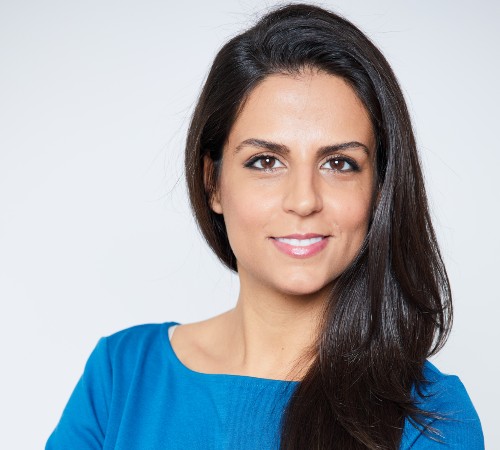The health system, taking part in HealthLeaders’ AI in Clinical Care Mastermind program, says AI has the potential to radically improve cancer diagnosis and treatment, but only with appropriate guardrails in place.
For cancer care specialists, one small needle of information in a haystack of data could mean the difference between effective treatment and a bad clinical outcome. And that’s where AI holds so much promise.
“AI can look at millions and billions of data points, at images, genomics raw data, at everything we know about the patients clinically, at social factors and other variables, and it can uncover patterns and answer questions,” says Nasim Eftekhari, chief AI and analytics officer at City of Hope.
Eftekhari, a participant in the HealthLeaders AI in Clinical Care Mastermind program, says the Los Angeles based health system, one of the largest and most advanced cancer research and treatment organizations in the country, is very deliberate in how it approaches AI, with a strategy that focuses on considered and steady development. She joined the organization in 2017 as one of its first data scientists, and says AI programs, from good old predictive modeling to generative AI should focus on data quality, good benchmarks, and proper validation.
“Good data beats more data every day,” she stresses.
Cancer care is a complex process, and one in which City of Hope has been fully immersed since its founding in 1913. Yet for all the advances made in diagnosis and treatment, there’s still a lot that healthcare providers don’t know about the disease.
“Cancer is probably the biggest, most difficult, still unanswered question,” Eftekhari says. “We don't even know exactly why it happens, and how to stop it from happening. That’s where the real potential of AI is, to help uncover that can explain some of those unanswered questions and help discover and design better [treatments,]” and better predict the onset of disease.
Eftekhari says generative AI “is a different paradigm” than traditional automation and predictive analytics programs, so City of Hope has had to adjust its guardrails accordingly. Small, incremental steps forward are preferred, as each change in the data can blossom into a much larger problem if unchecked.

Nasim Eftekhari, Chief Ai and Analytics Officer at City of Hope. Photo courtesy City of Hope.
She says healthcare organizations need to monitor their data, update their AI models often, watching for drift, making sure the information used in patient care is the latest available and the results from AI models are the best possible.
“We’re not doing this overnight,” she adds. “Because it’s always about the patient. Every decision that we make at every intersection is always centered around the patient.”
Eftekhari also believes that AI won’t advance in a vacuum, and that health systems and hospitals need to share their data and their methods to support progress. That may go against the idea that data has financial value and that organizations need to erect silos around that information.
To truly move the needle on cancer care, “the answer may lie in mountains and mountains of data that no single organization [may have] on their own.”
As with many other healthcare organizations, embracing AI in clinical care also means dealing with change management. Providers are generally hesitant to adopt new ideas, and need to be nudged forward, often with promises that their workflows will improve. Eftekhari says AI may have the potential to change healthcare, but it still has to prove its value and fight through the skepticism.
“How do you meaningfully deploy a machine learning or AI model in day-to-day workflows and how do you measure the impact?” she asks. “And how do you make sure that these models keep adding value?”
The answer to those questions, she says, may lie in focusing more on the people than the technology. AI will succeed if the providers using the technology are ready for it.
Organizations have strategies to invest in technology, “but what makes it really work is investing in people,” she says. “People who can actually make it work, who can bridge the gap between technology and healthcare. It’s a much smaller investment but it’s usually the hardest to get because it’s not the shiny new toy that everybody wants to have.”
The HealthLeaders Mastermind program is an exclusive series of calls and events with healthcare executives. This Mastermind series features ideas, solutions, and insights on excelling in your AI programs.
To inquire about participating in an upcoming Mastermind series or attending a HealtLeaders Exchange event, email us at exchange@healthleadersmedia.com.
Eric Wicklund is the Associate Content Manager and Senior Editor for Innovation and Technology at HealthLeaders.
KEY TAKEAWAYS
City of Hope is taking a measured approach to AI development, focusing on data quality, good benchmarks and proper governance.
Nasim Eftekhari, the health system’s chief AI and analytics officer, says generational AI is “a different paradigm” than traditional analytics and automation and has to handled carefully, with the focus on continuous monitoring.
Eftekhari says AI will play a crucial role in not only defining cancer and its causes, but developing new treatments and methods to cure or even eliminate the disease.
